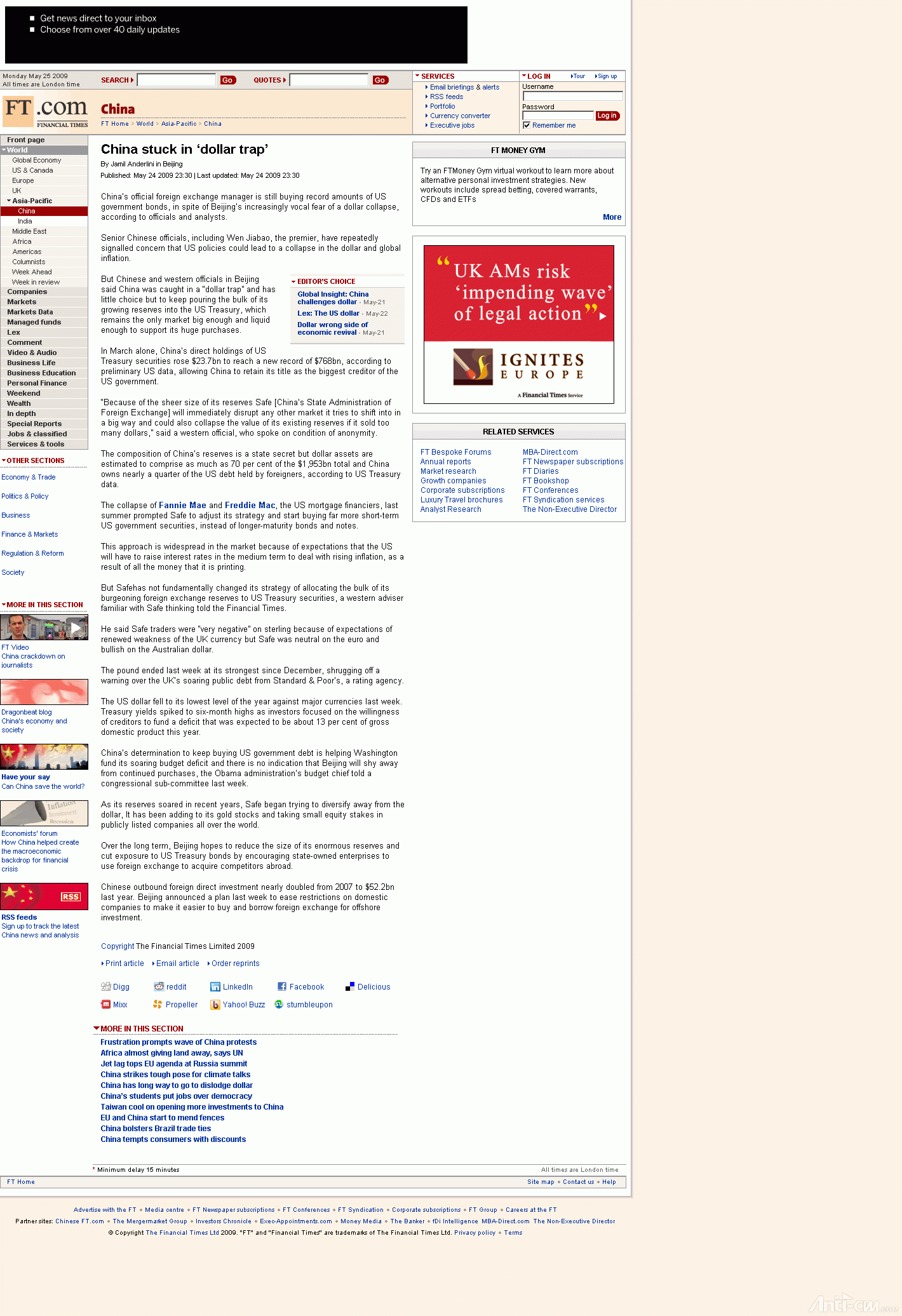|
|
本帖最后由 I'm_zhcn 于 2009-5-27 02:23 编辑
China stuck in ‘dollar trap’
http://www.ft.com/cms/s/0/5b47c8f8-488c-11de-8870-00144feabdc0.html
By Jamil Anderlini in Beijing Published: May 24 2009 23:30 | Last updated: May 24 2009 23:30
China’s official foreign exchange manager is still buying record amounts of US government bonds, in spite of Beijing’s increasingly vocal fear of a dollar collapse, according to officials and analysts.
Senior Chinese officials, including Wen Jiabao, the premier, have repeatedly signalled concern that US policies could lead to a collapse in the dollar and global inflation.
But Chinese and western officials in Beijing said China was caught in a “dollar trap” and has little choice but to keep pouring the bulk of its growing reserves into the US Treasury, which remains the only market big enough and liquid enough to support its huge purchases.
In March alone, China’s direct holdings of US Treasury securities rose $23.7bn to reach a new record of $768bn, according to preliminary US data, allowing China to retain its title as the biggest creditor of the US government.
“Because of the sheer size of its reserves Safe [China’s State Administration of Foreign Exchange] will immediately disrupt any other market it tries to shift into in a big way and could also collapse the value of its existing reserves if it sold too many dollars,” said a western official, who spoke on condition of anonymity.
The composition of China’s reserves is a state secret but dollar assets are estimated to comprise as much as 70 per cent of the $1,953bn total and China owns nearly a quarter of the US debt held by foreigners, according to US Treasury data.
The collapse of Fannie Mae and Freddie Mac, the US mortgage financiers, last summer prompted Safe to adjust its strategy and start buying far more short-term US government securities, instead of longer-maturity bonds and notes.
This approach is widespread in the market because of expectations that the US will have to raise interest rates in the medium term to deal with rising inflation, as a result of all the money that it is printing.
But Safe has not fundamentally changed its strategy of allocating the bulk of its burgeoning foreign exchange reserves to US Treasury securities, a western adviser familiar with Safe thinking told the Financial Times.
He said Safe traders were “very negative” on sterling because of expectations of renewed weakness of the UK currency but Safe was neutral on the euro and bullish on the Australian dollar.
The pound ended last week at its strongest since December, shrugging off a warning over the UK’s soaring public debt from Standard & Poor’s, a rating agency.
The US dollar fell to its lowest level of the year against major currencies last week. Treasury yields spiked to six-month highs as investors focused on the willingness of creditors to fund a deficit that was expected to be about 13 per cent of gross domestic product this year.
China’s determination to keep buying US government debt is helping Washington fund its soaring budget deficit and there is no indication that Beijing will shy away from continued purchases, the Obama administration’s budget chief told a congressional sub-committee last week.
As its reserves soared in recent years, Safe began trying to diversify away from the dollar, It has been adding to its gold stocks and taking small equity stakes in publicly listed companies all over the world.
Over the long term, Beijing hopes to reduce the size of its enormous reserves and cut exposure to US Treasury bonds by encouraging state-owned enterprises to use foreign exchange to acquire competitors abroad.
Chinese outbound foreign direct investment nearly doubled from 2007 to $52.2bn last year. Beijing announced a plan last week to ease restrictions on domestic companies to make it easier to buy and borrow foreign exchange for offshore investment.
Copyright The Financial Times Limited 2009

|
China, Dollar, stuck, Trap, China, Dollar, stuck, Trap, China, Dollar, stuck, Trap, 金融时报
评分
-
1
查看全部评分
-
|